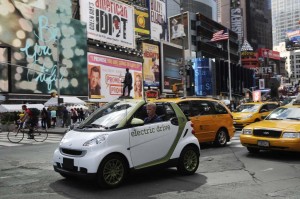
Will Toyota provide hybrid and other battery car components to Daimler for use in vehicles like the Smart Electric Drive?
Just days after announcing plans to show off a new battery car while adding a half-dozen new models to its hybrid line-up, Toyota Motor Co. reportedly plans to begin supplying battery-based components to its erstwhile rival, Daimler AG.
It would be the latest in a string of growing partnerships the two manufacturers individually have launched as they both move forward with the electrification of their various product lines.
According to a report in the Thursday evening Nikkei, Japan’s daily business paper, Daimler and Toyota also hope to begin cooperating on the development of hydrogen fuel cells, technology that many advocates hail as the ultimate form of clean powertrain technology.
While Toyota declined to confirm the Nikkei report, it has issued a statement saying that, “As has been our ongoing stance, if we receive requests from outside companies, we will consider the requests, taking into account factors concerning our production capacity and sales,” Toyota said in a statement.
In an interview with TheDetroitBureau.com, U.S. spokesman John Hanson noted that Toyota has already supplied its technology to Ford and Nissan “and would be open” to other opportunities, though “At this point we don’t have anything to announce with Mercedes,” Daimler’s flagship brand.
With its popular Prius model Toyota is the globe’s top-selling maker of hybrid-electric vehicles. Even then, sales of the high-mileage products has barely dented demand for more conventional gasoline and diesel-powered vehicles. In the U.S., for example, hybrids and battery-electric vehicles (BEVs) combined have about a 3% share of the market.
Driving up volume – whether producing more of its own hybrids or providing key components to other makers, such as Daimler. According to industry sources, Daimler would like to purchase the underlying technology behind the Toyota Hybrid Synergy Drive as well as components that might include batteries, motors and electronic control systems.
Daimler has been moving aggressively to electrify its various product lines – like most of its competitors, it has been driven by a mix of government mandates and a small but growing demand from consumers. Mercedes recently launched its first hybrid models and is readying several pure battery-electric vehicles, as well, including a lithium-powered version of its gull-winged SLS supercar. Meanwhile, the German maker also is testing a small fleet of battery-powered Smart fortwo microcars.
Toyota, meanwhile, is pushing to expand beyond its current range of hybrids, with two BEVs of its own. It plans to launch a city cruiser in 2012 with a range of about 50 miles. A battery-powered version of the maker’s RAV4, also due out in 2012, would roughly double that.
The RAV4-EV will be developed in cooperation with Tesla, the Silicon Valley-based battery car start-up. Toyota formed several ties earlier this year with Tesla; investing $50 million into the company, promising to develop products like the RAV4-EV, and turning over to Tesla the assembly plant it is abandoning in suburban San Francisco. The NUMMI facility will be used to produce Tesla’s Model-S sedan, also due to market in 2012.
Whether coincidental or not, Daimler has ties to Tesla, as well, the small start-up helping Daimler develop the Smart ED (or Electric Drive), while also working on possible battery car programs for Mercedes.
Whether Tesla might also become involved in a technology deal between Toyota and Daimler remains to be seen.
